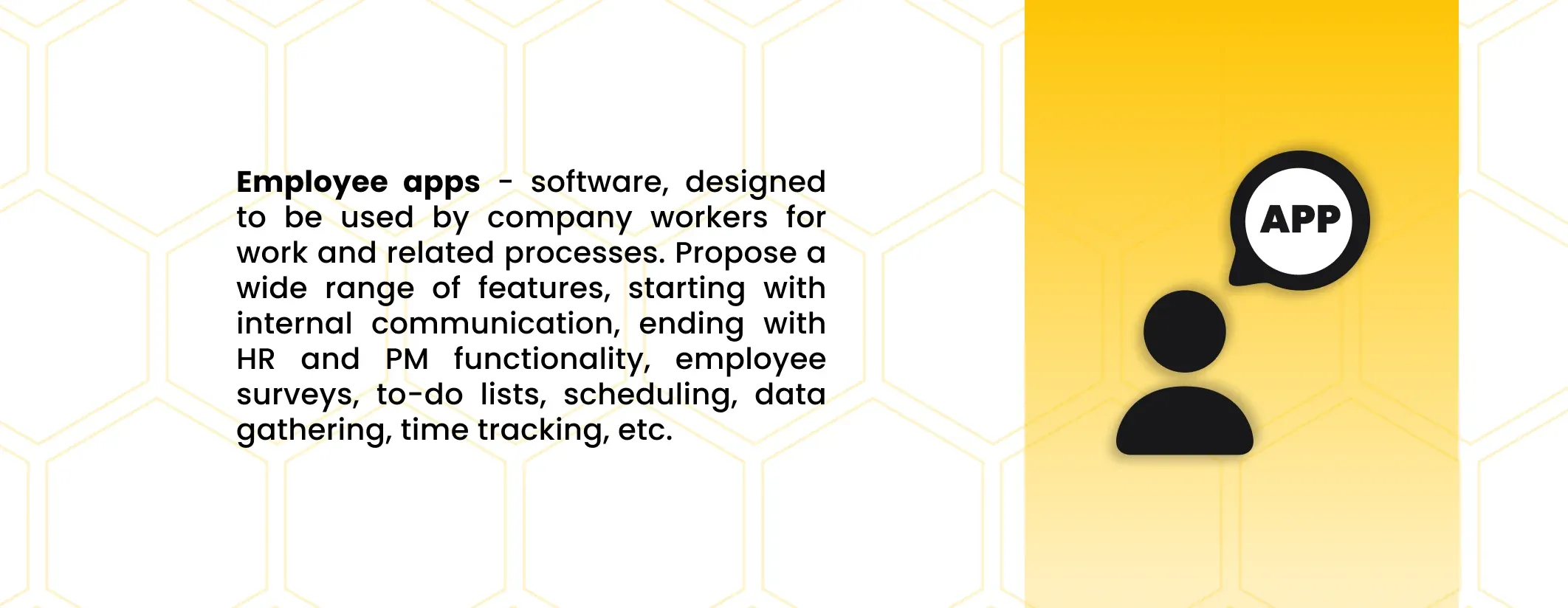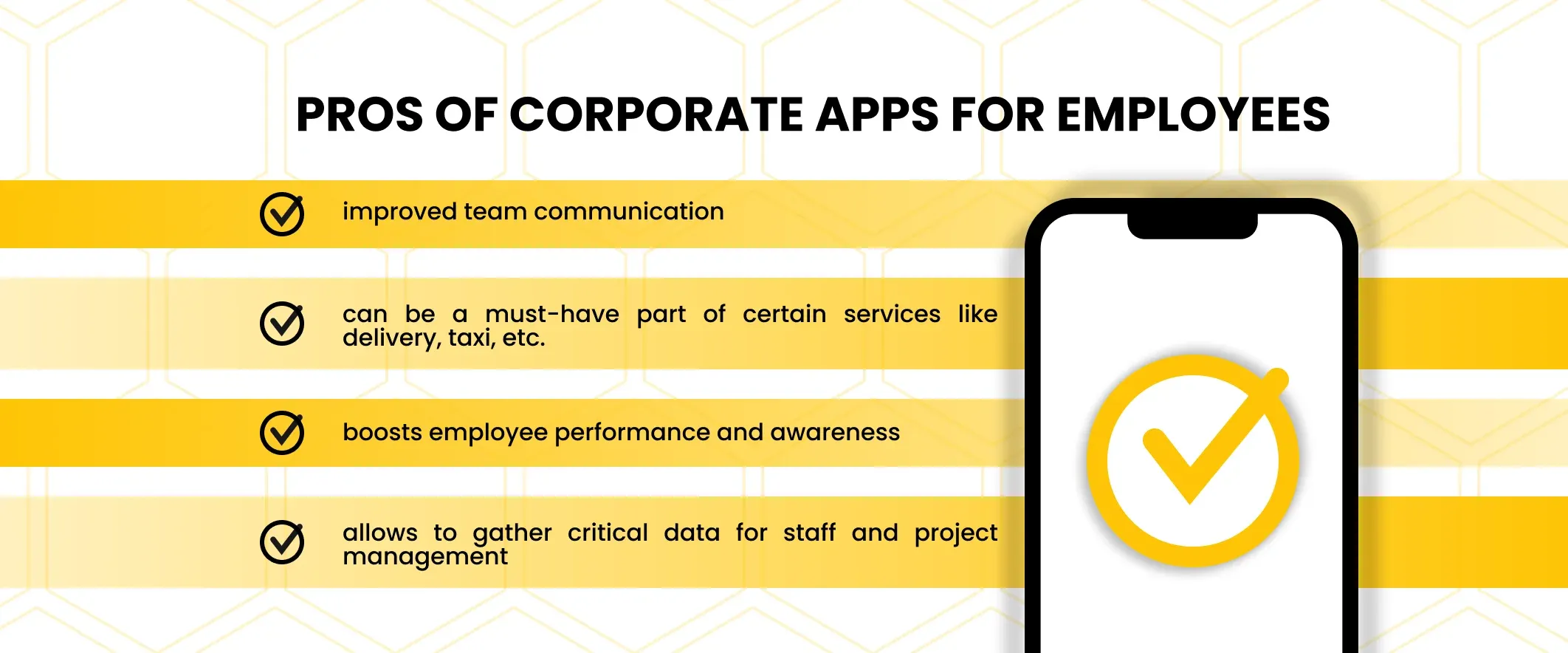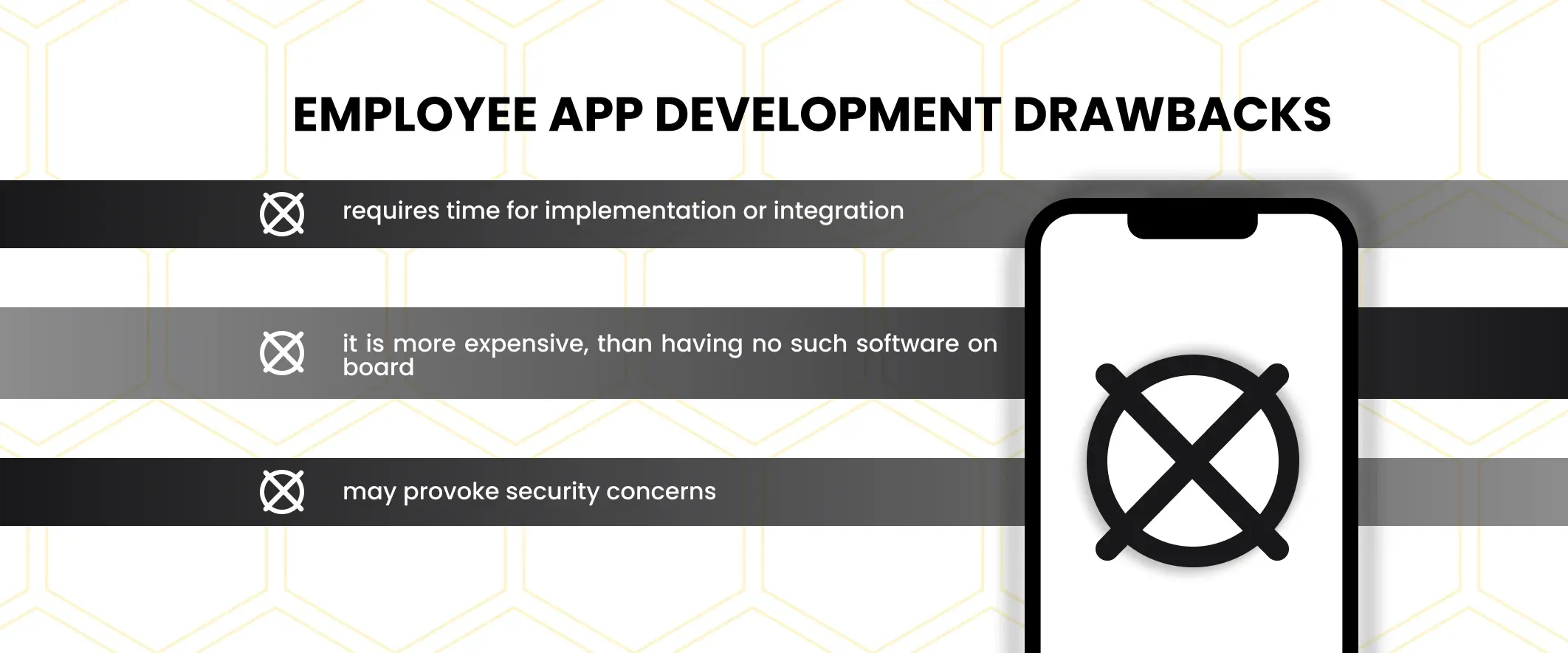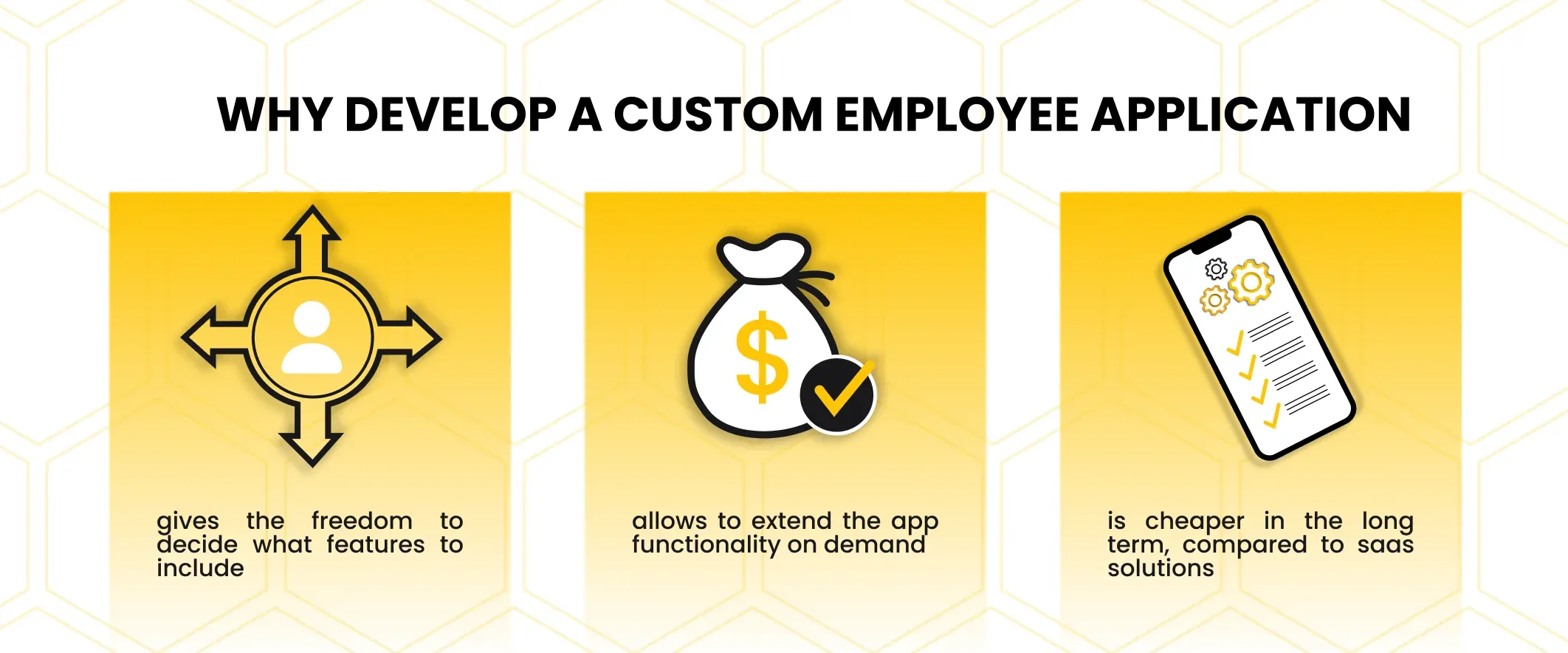Management Systems
How Mobile Apps for Employees Help to Achieve Business Goals and Boost Employee Performance
December 05, 2023 • 297 Views • 14 min read
Bohdan Vasylkiv
CEO & Co-Founder
Any business highly depends on the working team. Regardless of its specifics or industry, finding a dedicated team and providing them with essential resources is the key to business success.
Thanks to the evolution of the IT industry, there are numerous SaaS and ready-made software solutions, that help to create a friendly and convenient digital workplace and establish effective communication within the entire team. One of the most recent trends in business management is to create an employee engagement platform, where they can safely communicate on a daily basis, store all the required work-related data, and simplify the process of project management and data gathering and monitoring.
But are company culture apps for employees so efficient, that it is worth considering developing one, what are the pros and cons of such an idea, and do you need one in your company?
Employee Apps in a Nutshell
Let’s start with the basics.

Employee apps are standalone applications, designed to improve the performance of your HR department and provide the specialists with additional instruments, valuable for their activities. It includes employee time tracking, activity reports, fast issue reports, and responses. Additionally, it can be used to simplify the onboarding of new employees by providing them with all the needed information in a centralized way.
Yet, this is not the only use purpose for employee satisfaction apps.
It is hard to imagine a single business, which can operate without communication. Frankly, there is no need to explain how important team connection is. A corporate mobile app for employees can bring new value to such processes.
To make it simple, any employee engagement app is a powerful instrument, which significantly improves numerous aspects of any product or project management. It is not mandated to develop a mobile app specifically, yet having such a standalone solution for mobile devices gives a significant advantage to your company and team connection by giving 24/7 access to conversations, to-do lists, etc.
Project management, employee engagement, and KPI metrics tracking - all have become must-have aspects of any modern company. And employee apps are playing a significant role in ensuring them.
Pros and Cons of Mobile Apps for Employees
Despite the fact, that employee apps can exist as desktop solutions, or be based on a web platform, we highly recommend considering the development of a mobile version.
For illustration, let’s consider some of the major benefits and challenges of such development.
Advantages of Mobile Employee App

Employee Communication App
It is one of the most obvious and vital strengths of mobile applications. To be more specific, having a mobile app for your corporate needs allows your team members to stay informed and communicate under any circumstances. Also, when it comes to industries, that don’t include office work, these apps are the only possible solution.
Most such applications are used by companies like Glovo and Uber. There is even a McDonald's app for employees. Clearly, most job offers in these companies require “working in the field”, providing delivery or taxi services, or other highly active ways of work. In such conditions, most employees are simply unable to use a laptop or similar devices to communicate with the rest of the team or company representatives. So, mobile employee applications are an ideal solution for these cases.
Providing Essential Features
Most taxi companies or delivery services require downloading and using their mobile employee engagement app to perform their work, making it impossible to work for them without using corporate applications for mobile devices.
To make it simple, companies like Glovo and Uber, which work as aggregators and platforms to find the service provider and the end customer, have designed their applications specifically for particular working processes.
To rephrase it, some company apps for employees are the only way to become an employee, i.e. - perform your job. They are providing not only the employee profile or task assignment features but also propose some additional, yet important options like navigation services for taxi drivers.
Employee Performance Boost
It might be not as obvious, as the previous benefits, however, employee apps can greatly improve the performance of your employees.
It can be simply achieved by integrating various project management features like a Kanban system, a dashboard or calendar with all the deadlines and tasks, to-do lists, or any other similar functionality.
In such a scenario, your employees will be able to find all important information on the task they are doing, or assign themselves to the free tasks, if they have nothing to do at the moment in just a few clicks.
Besides, you can make your employee engagement solutions a Notion-like app, integrating similar features and functional capabilities and transforming it into a full-fledged platform for internal communication, task planning and scheduling, as well as remote employee productivity and performance tracking.
Data Gathering and Employee Retention
Eventually, employee mobile apps are a powerful, if not the only digital tool for gathering different metrics like worked hours, completed tasks, employee experience, success rate, etc.
All this information is essential for further career exploration, performance evaluation, and job satisfaction. You can use it as an employee experience platform, which will help you not only evaluate in-house or remote workers correctly but also find weaknesses in your company policies or other issues thanks to employee surveys or a wide range of other possible employee feedback options.
As a result, team or project managers can get more detailed and accurate info on each of the team members, make more precise estimations for further projects, better assign repetitive tasks, etc.
Alternatively, you can also provide your employees with guides or playbooks to help them improve themselves, gain new skills, and have a deeper understanding of how to gain new career opportunities within your company, empowering and supporting your employees.
Drawbacks of Employee App Development

Despite all the advantages, such a complex process as mobile employee app development brings some challenges as well.
Custom Pricing and Subscription Fee
The first, and most apparent issue with employee app development or SaaS integration - you will have to pay for it either way.
Regardless of your choice, both the ready-made product integration and standalone software development will cost some money and will take some time.
Clearly, developing an HR app for employees from scratch will take much longer and will cost significantly more at the beginning, compared to simply adopting an already-existing application like Staffbase or Connecteam. Still, it is true just in a few cases, mainly, when it comes to short or mid-term usage. Otherwise, if you are considering using an app for employees in the long term, then the difference might be not as significant.
To sum up, having any kind of mobile app for employees is undoubtedly more expensive, than having no such software on board. However, it is also much more efficient and convenient to have a corporate application for employee engagement, than not having one.
Is it worth the money? You decide, but judging from our experience, the answer is - yes, it is.
Security Concerns and Issues
Another important issue, worth resolution, when working with such software - is security policies and concerns.
Despite the variety of possible feature lists and versions, a centralized application for employees will have access to some vulnerable information, or data, which should be used for work only. It can be the personal information of your staff like name, surname, payroll data, etc., or some internal corporate information, which must be treated carefully. Even private messages between your employees may include some info, worth protecting.
This is why it is essential to ensure a high level of security so that it isn’t as easy to break into your system. OWASP list is a must-have to-do for at least a basic level of protection. Additionally, you can add two-factor authentication, or some other well-spread methods to improve the safety of any app.
Frankly speaking, it is not so hard to set up enough security policies to prevent most possible threats. Nevertheless, once again, to make it right, you will have to spend extra time and resources.
Alternatively, though, it is an issue for independent application development. Any SaaS HR app for employees is service-based, so the maintenance and data security are the responsibility of the company, you are paying to. This is one of the biggest advantages of choosing SaaS over own application development outsourcing.
Why to Choose Custom Employee App Development

Plainly speaking, we can talk about the advantages of choosing a custom employee app development for hours. Nonetheless, we believe it is better to define the key milestones and benefits and ignore all the rest minor features and details. So, why choose a custom app over SaaS?
First of all, custom employee applications can be designed and developed according to any of your preferences and business process requirements. You can literally add any functionality you want.
Secondly, you will be in charge of the app, having access to any application part or component and being able to change them at any time. Besides, this also allows you to implement new features or options you desire, unlike the SaaS solutions, which are limited to predefined subscription plans and packages. For example, you can implement an AI for HR automation to improve some employee management and tracking processes.
Eventually, in such cases, you won’t be limited to the number of employee profiles, or feature access. Additionally, standalone employee application development is cheaper than a monthly paid app as a service from a long-term perspective.
Company Apps Development with Incora
It might seem, that choosing a custom employee app over an HR SaaS is a simple choice. It is not.
To make a balanced choice, that you won’t regret, we highly recommend you get in touch with niche-experienced developers to get advice and make the right bet.
Fortunately, here at Incora, we have several developers with proven experience in developing such type of software. To prove our point, we advise you to check out case studies before contacting us.
What’s your impression after reading this?
Love it!
1
Valuable
1
Exciting
1
Unsatisfied
1
FAQ
Let us address your doubts and clarify key points from the article for better understanding.
How do mobile apps for employees contribute to achieving business goals?
Mobile apps for employees play a crucial role in achieving business goals by enhancing communication, streamlining processes, and promoting collaboration. They enable real-time access to information, fostering quicker decision-making and facilitating a more agile and responsive work environment.
In what ways do mobile apps improve communication within the organization?
Mobile apps facilitate instant and efficient communication by providing a platform for employees to share updates, exchange information, and collaborate seamlessly. Features such as push notifications ensure that important messages are delivered promptly, fostering better connectivity among team members.
How do these apps streamline business processes?
Mobile apps automate and streamline various business processes, reducing manual efforts and minimizing errors. They can integrate with existing systems, allowing employees to access and update critical information on-the-go, ultimately enhancing overall operational efficiency.
Can mobile apps for employees enhance employee engagement?
Absolutely. These apps often include features that promote employee engagement, such as surveys, feedback mechanisms, and recognition programs. By fostering a sense of belonging and involvement, they contribute to improved job satisfaction and productivity.
How do mobile apps support remote work and flexibility?
Mobile apps enable employees to work from anywhere, breaking down geographical barriers. This flexibility enhances work-life balance, boosts employee morale, and ensures that productivity isn’t compromised, especially in scenarios like remote work or business trips.
How can mobile apps improve training and development initiatives?
Mobile apps offer a platform for convenient and accessible training modules. Whether through e-learning courses or on-the-job tutorials, these apps empower employees to continuously develop their skills, contributing to their professional growth and aligning with the organization's goals.
Do mobile apps contribute to data-driven decision-making?
Yes, mobile apps often come with analytics features that provide valuable insights into employee performance, user behavior, and other relevant metrics. This data-driven approach assists leadership in making informed decisions, optimizing processes, and aligning strategies with business goals.
How can mobile apps improve employee productivity?
Mobile apps enhance productivity by reducing downtime. With easy access to relevant information, task management tools, and collaboration features, employees can complete tasks more efficiently, leading to increased overall productivity.
What security measures are in place to protect sensitive information within these apps?
Security is a paramount concern. Mobile apps for employees typically employ encryption, secure authentication methods, and compliance with industry standards to safeguard sensitive information. Regular updates and patches further ensure the app's resilience against security threats.
YOU MAY ALSO LIKE
Let’s talk!
This site uses cookies to improve your user experience. Read our Privacy Policy
Accept

Share this article